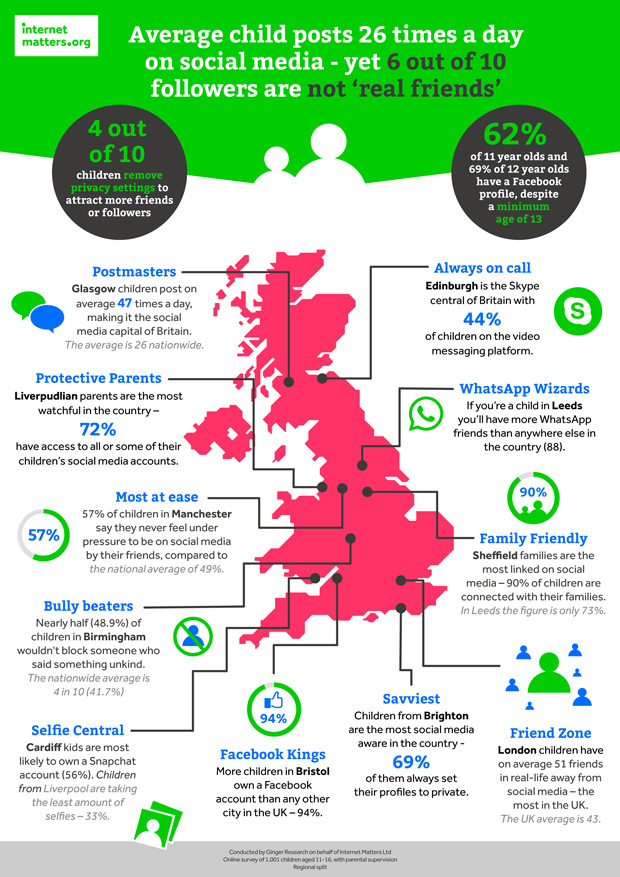Primary Times - the definitive what’s on and where to go family guide of activities and events for children of primary school age. Things to do with your kids during the school holidays including arts and craft activities, music and theatre for children, parties, competitions, days out, and family attractions along with term time drama schools, dance classes, after school clubs and sports activities. Things to do at a place near you!
Average UK child posts 26 times a day on social media
 Internet Matters today launches a campaign to help parents protect their children across social media, as new figures reveal children as young as 11 post an average of 26 times a day and attract 100 followers per network - yet six out of 10 of them are not real friends.
Internet Matters today launches a campaign to help parents protect their children across social media, as new figures reveal children as young as 11 post an average of 26 times a day and attract 100 followers per network - yet six out of 10 of them are not real friends.
Parents are being given tips on how to tackle issues from privacy, tagging and geo-location settings, to stranger-danger, cyberbullying and sexting, to give them more confidence in keeping up with what their children are doing online, dealing with the rapid pace of change in the digital playground, and the knowledge to discuss risks of social media.
The new survey by Internet Matters - exploring the extent children aged between 11 and 16 are living their lives online - shows how a child living in Glasgow claimed to post more than three times the amount as a child in Brighton. Children in Glasgow claimed to post 47 times a day, making it the kids social media capital of Britain; compared to Brighton where the average was 13 times a day.
The average child has 144 friends on Facebook, 125 on Instagram, 114 Twitter followers and 90 on Snapchat, according to the poll. However, they said they only have 43 friends in real life away from social media.
Associate Professor Dr Emma Bond, an expert children and mobile technologies at University Campus Suffolk (UCS), commented: “Childhood is a time when friendship is really important. At any age, having friends is important for good mental health and wellbeing and children’s friendships are vital to their social and emotional development. Children want to have lots of friends and be liked both in the playground and online. Social media gives them the opportunity to socialise with their friends but also to have people as online friends that they have never met in real life. Many children, however, are unaware of the dangers of having online friends who are actually strangers.”
Just like helping their children through friendship problems in real-life - helping them in their online worlds is just as important.
Dr Bond added: “Parents want their children to talk to them if they have a problem or if they are worried about something. Parents want to help their children but when it comes to social media, virtual realities or online gaming, they often feel that they do not have enough knowledge or experience. It’s vitally important that parents talk to their children about the internet, social media and mobile technologies.”
67% of children surveyed said the number of followers or friends on social media was important to them. Nearly half (49.9%) said they would ‘always’ or ‘sometimes’ accept friend requests from people they had never met.
Four out of 10 admitted they ‘sometimes’ or ‘always’ changed their privacy settings to ‘public’ to attract more friends and followers. 56% always set their profiles to ‘private’, 8% say they never did and 36% ‘sometimes’ would.
Over half of children said they were ‘sometimes’ or ‘always’ feeling under pressure from friends to be on social media. 58% said they had blocked or unfriended someone because they were unkind. Over half of children (54%) thought they spent too long on social media and 62% said their parents thought the same about them.
Facebook was by far the most popular network among those surveyed – with 83% of 11 to 16-year-olds having a profile. This compares to just 39% on Twitter. Meanwhile, 62% of 11-year-olds and 69% of 12-year-olds said they had a Facebook profile, despite an age minimum of 13. YouTube has become the second most popular social media tool for children. More than half of children said they had a profile (51%).
Carolyn Bunting, General Manager of Internet Matters, said: “We know parents find it hard to talk to their children about digital safety and often bury their heads in the sand, especially when it comes to social media and they see their children skipping from network to network.
“Today we are launching a campaign to engage parents in the social lives of their children online. We are giving parents the skills they need to understand the risks children may need to deal with and how this might affect them.
“We hope these resources will provide practical support to minimise the risks and give advice on whatever your child is doing on the internet. Most importantly we want to hammer home the importance of talking to your children in the offline world so you can keep them safe in the online world. Our message is to keep talking to your children and stay involved.”
Joining the campaign, several parents and their children have opened up about their own social media worlds and shared their experiences - both good and bad. Nicola Jenkins revealed how her 14-year-old son has 900 followers on Instagram yet he only knows 200 of them in real-life. She has also banned her 12-year-old daughter from the same network after another mum complained she had sent a nasty message to her daughter.
Nicola said: “It’s worse with girls as they can be a lot meaner. And now it doesn’t stop once they leave the school gates. They’re so obsessed with how they look. Maisie would post lots of selfies with her wearing make-up and posing which anyone could see. We found out that Maisie had been sending horrible messages to one of her friends on Instagram so we’ve removed her profile and banned it from her phone – she won’t be allowed an account until she’s much older.”





